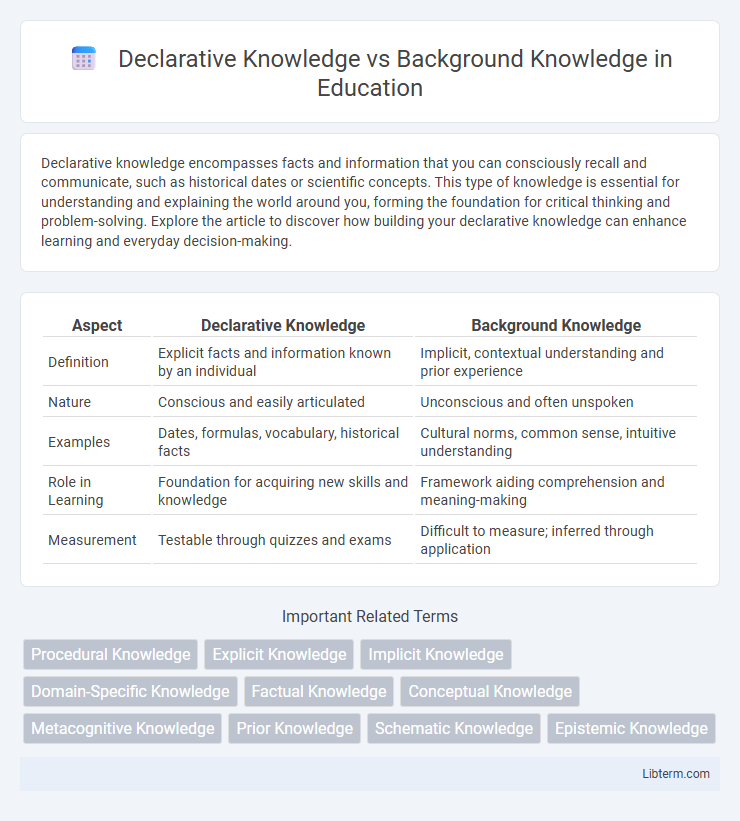Declarative knowledge encompasses facts and information that you can consciously recall and communicate, such as historical dates or scientific concepts. This type of knowledge is essential for understanding and explaining the world around you, forming the foundation for critical thinking and problem-solving. Explore the article to discover how building your declarative knowledge can enhance learning and everyday decision-making.
Table of Comparison
| Aspect | Declarative Knowledge | Background Knowledge |
|---|---|---|
| Definition | Explicit facts and information known by an individual | Implicit, contextual understanding and prior experience |
| Nature | Conscious and easily articulated | Unconscious and often unspoken |
| Examples | Dates, formulas, vocabulary, historical facts | Cultural norms, common sense, intuitive understanding |
| Role in Learning | Foundation for acquiring new skills and knowledge | Framework aiding comprehension and meaning-making |
| Measurement | Testable through quizzes and exams | Difficult to measure; inferred through application |
Introduction to Declarative and Background Knowledge
Declarative knowledge refers to factual information and explicit details that individuals can consciously recall, such as dates, definitions, and specific concepts. Background knowledge encompasses the broader context and understanding accumulated through experience, including cultural, social, and situational insights that influence comprehension and reasoning. Effective learning and problem-solving depend on integrating both declarative knowledge and background knowledge to create meaningful connections and deepen understanding.
Defining Declarative Knowledge
Declarative knowledge refers to explicit information a person can consciously recall and verbalize, such as facts, definitions, and concepts. It encompasses knowledge about "what" something is, including data, events, and rules stored in long-term memory. This foundational knowledge contrasts with background knowledge, which involves implicit understanding and context gained through experience.
Understanding Background Knowledge
Background knowledge encompasses the pre-existing information and experiences stored in long-term memory that influence comprehension and problem-solving in new situations. It provides a contextual framework enabling individuals to interpret declarative knowledge, which consists of factual information consciously recalled. Understanding background knowledge is crucial for effective learning because it shapes how new data is integrated and applied in real-world contexts.
Key Differences Between Declarative and Background Knowledge
Declarative knowledge refers to factual information and explicit details that individuals can consciously recall, such as dates, names, and specific events, whereas background knowledge encompasses the broader context and implicit understanding gained from experiences and prior learning. Declarative knowledge is easily articulated and stored in memory as discrete facts, while background knowledge operates more subconsciously, influencing comprehension and problem-solving without direct awareness. The key difference lies in their cognitive accessibility: declarative knowledge is explicit and retrievable, whereas background knowledge is implicit and foundational for interpreting new information.
The Role of Declarative Knowledge in Learning
Declarative knowledge, which encompasses facts, concepts, and information, serves as a foundational element in the learning process by enabling learners to comprehend and recall essential content. It facilitates the integration of new information with existing cognitive structures, enhancing understanding and problem-solving abilities. Mastery of declarative knowledge supports the development of advanced skills and promotes effective application across diverse learning contexts.
The Importance of Background Knowledge in Comprehension
Background knowledge plays a critical role in reading comprehension by enabling readers to make connections between new information and what they already know, thus facilitating deeper understanding and retention. Unlike declarative knowledge, which consists of explicit facts and information, background knowledge provides the contextual framework necessary for interpreting text meaningfully. Studies show that readers with extensive background knowledge can infer implied meanings more effectively and integrate new content into their existing cognitive schemas.
Examples of Declarative Knowledge in Education
Declarative knowledge in education includes facts, definitions, and concepts such as historical dates, mathematical formulas, and vocabulary terms essential for foundational learning. Students recalling the parts of a cell in biology or the rules of grammar in a language class demonstrate declarative knowledge use. This type of knowledge contrasts with background knowledge, which comprises broader understanding accumulated from experiences supporting comprehension and application of new information.
How Background Knowledge Influences Understanding
Background knowledge shapes comprehension by providing context that connects new information to existing mental frameworks, enhancing retention and interpretation. It allows individuals to fill gaps in content, infer meanings, and create deeper associations beyond explicit statements found in declarative knowledge. This cognitive foundation improves learning efficiency and supports critical thinking by linking factual details to broader experiences.
Integrating Both Types of Knowledge for Effective Learning
Integrating declarative knowledge, which involves facts and information, with background knowledge, encompassing prior experiences and context, enhances effective learning by enabling deeper understanding and application. Leveraging declarative knowledge as a foundation while activating relevant background knowledge facilitates connections between new information and existing mental frameworks. This integration promotes critical thinking, problem-solving, and retention, making learning more meaningful and adaptable across diverse contexts.
Conclusion: Maximizing Educational Outcomes Through Knowledge Types
Maximizing educational outcomes requires leveraging both declarative knowledge, which encompasses explicit facts and information, and background knowledge, the contextual understanding that supports comprehension and application. Effective instruction integrates these knowledge types to enhance retention, problem-solving, and critical thinking skills. Prioritizing balanced development of declarative and background knowledge fosters deeper learning and adaptability across diverse educational contexts.
Declarative Knowledge Infographic

 libterm.com
libterm.com